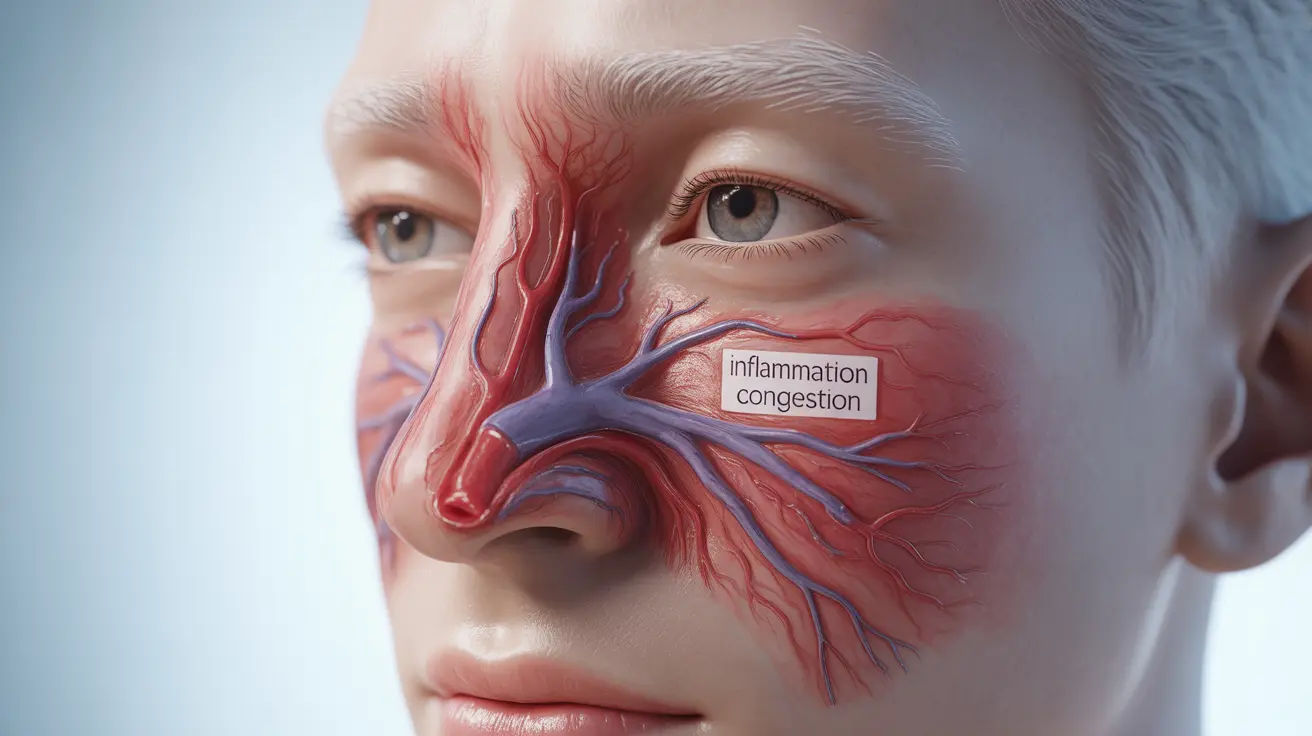When blood vessels in your nose become inflamed, it can lead to uncomfortable symptoms like congestion, runny nose, and general discomfort. This condition, often associated with vasomotor rhinitis, affects many people and can significantly impact daily life. Understanding the causes, symptoms, and treatment options is crucial for managing this condition effectively.
While inflamed nasal blood vessels can result from various factors, identifying your specific triggers and working with healthcare providers can help develop an effective management strategy. Let's explore this condition in detail to help you better understand and address your symptoms.
Understanding Nasal Blood Vessels and Inflammation
The nose contains an intricate network of blood vessels that play vital roles in warming, humidifying, and filtering the air we breathe. When these vessels become inflamed, they can dilate and cause the nasal tissues to swell, leading to various uncomfortable symptoms.
This inflammation can occur due to various physiological and environmental factors, affecting the normal function of your nasal passages and causing discomfort.
Common Causes and Triggers
Several factors can trigger inflammation in nasal blood vessels:
- Temperature changes and weather fluctuations
- Strong odors and chemical irritants
- Changes in hormone levels
- Certain medications
- Stress and emotional factors
- Environmental irritants
- Spicy foods
- Air pollution
Understanding your specific triggers is crucial for managing symptoms effectively and preventing flare-ups.
Recognizing the Symptoms
When blood vessels in the nose become inflamed, you may experience:
- Nasal congestion
- Runny nose with clear discharge
- Post-nasal drip
- Facial pressure or discomfort
- Difficulty breathing through the nose
- Sneezing
- Reduced sense of smell
Diagnosis and Evaluation
Healthcare providers typically diagnose inflamed nasal blood vessels through a combination of physical examination and medical history review. They may perform specific tests to rule out other conditions like allergies or infections.
The diagnostic process often includes:
- Detailed symptom assessment
- Physical examination of the nasal passages
- Allergy testing when necessary
- Evaluation of potential triggers
- Review of medical history
Treatment Approaches
Medical Treatments
Several medical treatments can help manage inflamed nasal blood vessels:
- Nasal corticosteroid sprays
- Antihistamines
- Decongestants (short-term use only)
- Saline nasal sprays
- Anticholinergic medications
Lifestyle Modifications
Making certain lifestyle changes can significantly improve symptoms:
- Using a humidifier in dry environments
- Avoiding known triggers
- Maintaining good nasal hygiene
- Staying hydrated
- Using air purifiers
- Managing stress levels
Prevention Strategies
Preventing blood vessel inflammation in the nose involves:
- Identifying and avoiding personal triggers
- Maintaining optimal indoor humidity
- Regular nasal irrigation
- Protecting the nose from extreme temperatures
- Managing underlying health conditions
Frequently Asked Questions
What causes the blood vessels in the nose to become inflamed and swollen in vasomotor rhinitis? Blood vessels in the nose become inflamed due to various triggers including temperature changes, strong odors, hormonal fluctuations, and environmental irritants. The condition occurs when the autonomic nervous system overreacts to these stimuli, causing blood vessels to dilate and become inflamed.
What are the common triggers that worsen inflamed blood vessels in the nose causing nasal congestion and runny nose? Common triggers include weather changes, strong fragrances, chemical irritants, spicy foods, stress, certain medications, and environmental pollutants. Each person may have different specific triggers that cause their symptoms to worsen.
How is vasomotor rhinitis, characterized by inflamed nasal blood vessels, diagnosed and distinguished from allergies? Diagnosis involves a thorough medical history, physical examination, and sometimes allergy testing to rule out allergic reactions. Unlike allergies, vasomotor rhinitis symptoms are triggered by non-allergic stimuli and don't respond to allergy medications.
What are the effective treatment options to manage inflamed blood vessels in the nose due to vasomotor rhinitis? Treatment options include nasal corticosteroid sprays, antihistamines, decongestants, saline sprays, and anticholinergic medications. The choice of treatment depends on symptom severity and individual response to different medications.
How can lifestyle changes and trigger avoidance help reduce symptoms caused by inflamed blood vessels in the nose? Lifestyle modifications such as using humidifiers, avoiding known triggers, maintaining good nasal hygiene, staying hydrated, and managing stress can significantly reduce symptoms. Creating an environment that minimizes exposure to triggers is key to symptom management.




